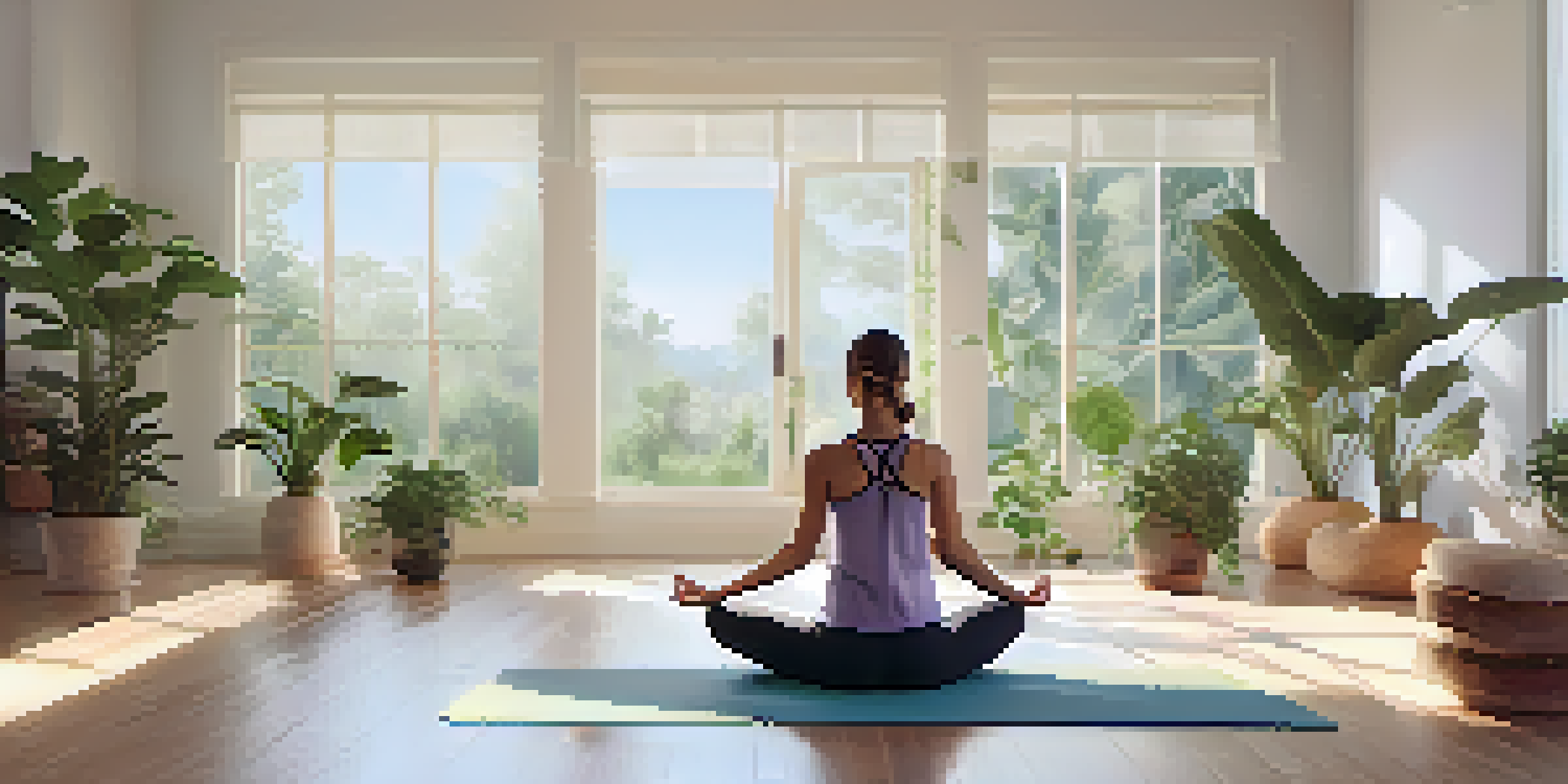The Impact of Yoga on Stress Reduction and Emotional Health

Understanding Stress and Its Effects on Health
Stress can feel like a heavy backpack we carry every day. It's that knot in your stomach before a big presentation or the racing thoughts that keep you up at night. Chronic stress, if left unchecked, can lead to serious health issues such as anxiety, depression, and even heart disease.
Yoga is the journey of the self, through the self, to the self.
Many people experience stress in various forms, from work pressures to personal challenges. Understanding how stress impacts our bodies and minds is crucial in finding effective coping mechanisms. By recognizing the signs of stress, we can take proactive steps to manage it before it escalates.
This is where yoga comes into play. It offers a holistic approach to stress reduction, combining physical movement, breath control, and mindfulness. But how exactly does yoga help alleviate that burdensome feeling?
The Science Behind Yoga and Stress Relief
Research shows that practicing yoga can decrease the production of stress hormones like cortisol. When we engage in yoga, we stimulate the parasympathetic nervous system, which helps our body enter a state of relaxation. This physiological response is essential for combating the effects of stress.

Furthermore, yoga encourages mindfulness—a practice of staying present and fully engaged in the moment. This focus can help quiet the mind, making it easier to release worries about the past or future. By incorporating mindfulness, practitioners often find they can navigate life's challenges with greater ease.
Yoga Reduces Stress Effectively
Practicing yoga helps lower stress hormones and promotes relaxation through physical movement and mindfulness.
In essence, yoga serves as a bridge between the mind and body, promoting harmony and balance. This connection is vital for achieving emotional well-being, making yoga an invaluable tool for stress management.
Yoga Techniques for Stress Reduction
There are various yoga techniques specifically designed for stress relief. Gentle forms like Hatha and Yin yoga focus on slow movements and deep stretches, allowing the body to relax and release tension. These practices can be particularly helpful for beginners or those who may feel overwhelmed by more intense styles.
In the midst of movement and chaos, keep stillness inside of you.
Breathwork, or pranayama, is another key component of yoga that aids in stress reduction. Simple breathing exercises can calm the nervous system and help center the mind. For example, practicing deep belly breathing can create a soothing effect, similar to taking a mini-vacation from your worries.
Incorporating these techniques into your daily routine can significantly reduce stress levels over time. Even just a few minutes of yoga each day can create a ripple effect, improving not only your mood but also your overall quality of life.
Emotional Benefits of Regular Yoga Practice
Beyond stress reduction, yoga offers substantial emotional benefits. Many practitioners report increased feelings of joy and contentment after regular sessions. This boost in mood can be attributed to the release of endorphins and the cultivation of self-awareness through mindful movement.
Yoga also encourages self-acceptance, fostering a positive relationship with oneself. As individuals learn to appreciate their bodies and abilities, they may find it easier to manage negative emotions like anxiety or sadness. This shift in perspective can be transformative.
Emotional Benefits of Yoga
Regular yoga practice fosters emotional resilience and self-acceptance, enhancing overall well-being.
In essence, yoga not only helps in managing stress but also creates a solid foundation for emotional resilience. This resilience allows individuals to face life's ups and downs with a more balanced outlook.
Yoga as a Tool for Managing Anxiety
Anxiety can often feel like a relentless storm, clouding our thoughts and making everyday tasks seem daunting. Yoga serves as a powerful tool for managing anxiety by providing techniques to calm the mind and body. Engaging in physical postures can help release pent-up energy associated with anxious feelings.
Moreover, the focus on breath control inherent in yoga practice can help ground anxious thoughts. Techniques like alternate nostril breathing encourage a sense of balance and tranquility, both mentally and physically. This simple practice can be done anywhere, making it a handy tool for those moments of heightened anxiety.
In this way, yoga empowers individuals to reclaim their sense of peace and control. By incorporating these practices, many find they can navigate their anxiety more effectively, leading to a more fulfilled life.
Building a Sustainable Yoga Practice
Creating a sustainable yoga practice is key to reaping its full benefits. It's essential to find a routine that fits into your lifestyle, whether that means attending classes at a studio or practicing at home. The important thing is consistency; even a short daily session can be more effective than occasional longer practices.
Experimenting with different styles can also help you discover what resonates most with you. Some may prefer the energy of Vinyasa, while others might find solace in restorative yoga. The beauty of yoga is that there’s something for everyone, allowing each individual to create a personalized practice.
Incorporate Yoga Daily
Integrating yoga into your everyday routine, even in small ways, can significantly improve your stress management and emotional health.
Lastly, don’t forget to listen to your body. Yoga is not about perfection; it’s a personal journey toward self-discovery and well-being. Embracing this journey can lead to a deeply rewarding experience that enhances both stress management and emotional health.
Incorporating Yoga into Daily Life
Incorporating yoga into your daily routine doesn’t have to be complicated. You can start with just a few minutes each day, finding pockets of time to stretch or practice breathing exercises. Whether it's a morning routine to kickstart your day or a few calming poses before bed, every little bit helps.
Consider integrating yoga into other activities as well. For instance, you can practice mindful breathing while commuting or take a moment to stretch during your work breaks. These small adjustments can create a more mindful approach to your day, enhancing your overall emotional well-being.

Ultimately, the goal is to make yoga a natural part of your life. By embracing this ancient practice, you’ll not only reduce stress but also cultivate a deeper connection with yourself, leading to a more balanced and fulfilling existence.